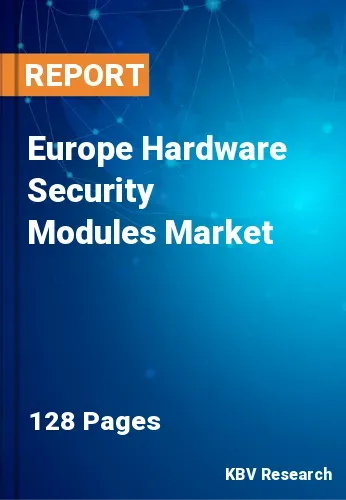The Europe Hardware Security Modules Market would witness market growth of 12.0% CAGR during the forecast period (2022-2028).
The modules may be written using C, NET, Java, or more programming languages. In addition, future HSMs of the next generation are capable of handling more sophisticated tasks, such as loading and executing whole operating systems or COTS software, without needing customization or reprogramming. These unorthodox designs surpass the design and performance limits of standard HSMs. In addition to safeguarding application-specific code, such execution engines safeguard the FIPS or Common Criteria validation status of an HSM.
HSMs and/or the cryptographic modules are often certified to globally recognized standards, including Common Criteria or FIPS 140, in order to give independent assurance to customers that the product's design and implementation are secure. Security Degree 4 is the highest level of certification achievable for FIPS 140 security.
In applications for financial payments, the security of an HSM is frequently evaluated against the HSM standards. Any program that utilizes digital keys may incorporate a hardware security module. Typically, the credentials would be of great value, meaning that if they were compromised, the owner would suffer severe consequences. Any program that utilizes digital keys may incorporate a hardware security module.
The European hardware security module market is estimated to grow significantly in the coming years, majorly owing to the presence of a significant number of market players operating within the region. The region offers a substantial untapped market for hardware security modules. The European Union-funded E-Safety Vehicle Intrusion Protected Applications (EVITA) project was an automotive cybersecurity initiative that sought to fortify the automotive on-board network's rigidity and resistance to threats and malware from emerging V2X applications in addition to physical attacks made possible by attackers' ability to gain physical access to vehicles in a public environment.
The Germany market dominated the Europe Hardware Security Modules Market by Country in 2021; thereby, achieving a market value of $171.3 million by 2028. The UK market is exhibiting a CAGR of 11.1% during (2022 - 2028). Additionally, The France market would experience a CAGR of 12.9% during (2022 - 2028).
Based on Deployment Type, the market is segmented into Cloud and On-premise. Based on Application, the market is segmented into Payment Processing, Authentication, Database Encryption, Code & Document Signing, Application-level encryption, PKI & Credential Management, and Security Sockets Layer (SSL) & Transport Security Layer (TSL). Based on Type, the market is segmented into LAN Based/ Network Attached, PCI-Based/ Embedded Pluggins, and USB Based/ Portable & Smart Cards. Based on Vertical, the market is segmented into BFSI, Public Sector/ Government, Aerospace & Defense, and Medical & Life Sciences. Based on countries, the market is segmented into Germany, UK, France, Russia, Spain, Italy, and Rest of Europe.
Free Valuable Insights: The Global Hardware Security Modules Market will Hit $2.2 Billion by 2028, at a CAGR of 12.8%
The market research report covers the analysis of key stake holders of the market. Key companies profiled in the report include Microsoft Corporation, Amazon.com, Inc., IBM Corporation, Microchip Technology, Inc., Thales Group S.A., Atos Group, Futurex LP, STMicroelectronics N.V., Lattice Semiconductor Corporation and Infineon Technologies AG
By Deployment Type
By Application
By Type
By Vertical
By Country

Our team of dedicated experts can provide you with attractive expansion opportunities for your business.

